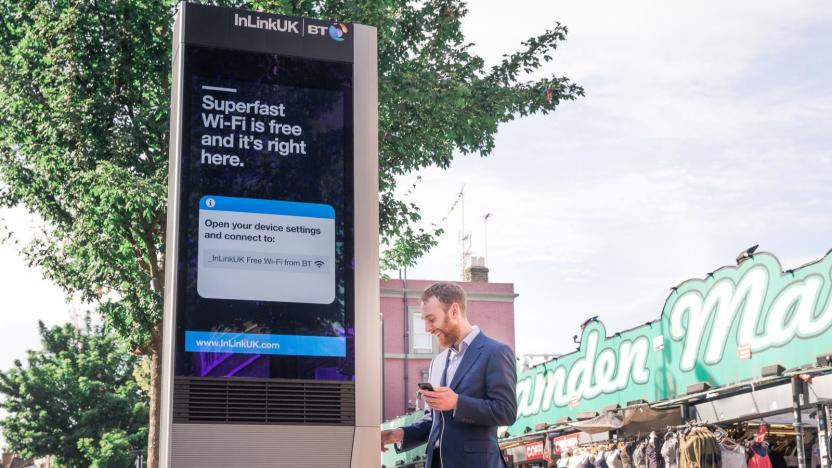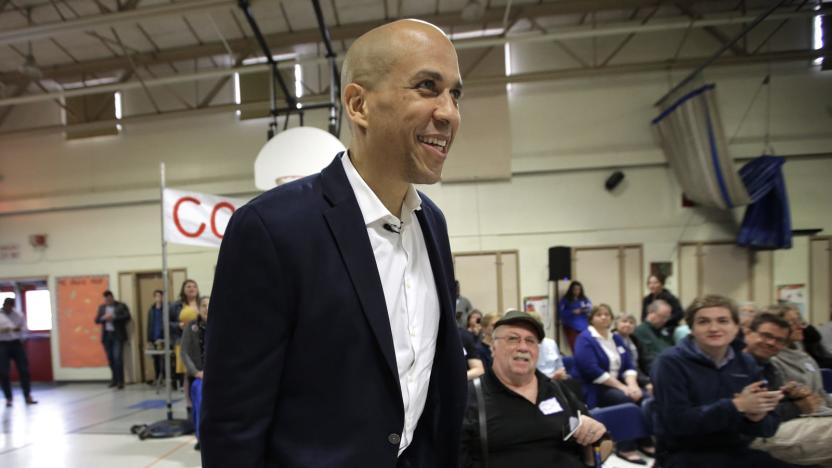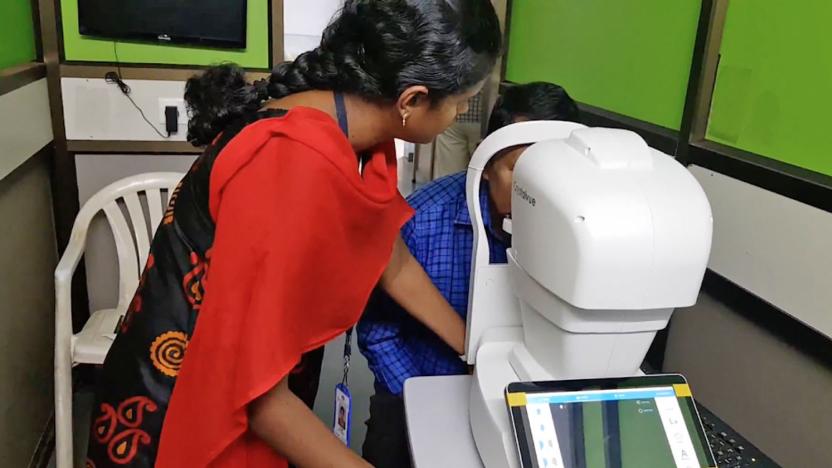algorithm
Latest

DeepMind AI can predict kidney illness 48 hours before it occurs
Acute Kidney Injury (AKI) kills 500,000 people in the US and 100,000 in the UK annually, often because it's not detected soon enough. Researchers want to use AI to change that. DeepMind, the Alphabet-owned AI company, partnered with the US Department of Veterans Affairs (VA) to develop an AKI prediction algorithm. In a paper published in Nature today, the partners share their findings that the algorithm can predict the presence of AKI up to 48 hours before it happens. The model correctly identified 9 out of 10 patients whose condition worsened to the point that they needed dialysis.

Netflix cancels animated comedy 'Tuca & Bertie' after one season
Even a stellar cast and team of Bojack Horseman producers, led by creator Lisa Hannwalt, couldn't save the animated series Tuca & Bertie from Netflix's axe. The streaming company announced that the series, starting Tiffany Haddish and Ali Wong, would not be back for a second season. "While Tuca & Bertie won't have a second season, we're proud to feature this story on Netflix for years to come," Netflix said in a statement.

A Bluetooth vulnerability could give hackers your location
Your Fitbit and other Bluetooth gadgets could be giving away your location data. Researchers from Boston University (BU) detected a vulnerability in several high-profile Bluetooth devices that could allow third-parties to determine your location and other sensitive information. In the wrong hands, that information could be used for stalking or abuse. That's especially concerning given that basically everyone is carrying around a Bluetooth device.

Watch super slow-mo video from a camera with human-like vision
Conventional video cameras that capture scenes frame by frame have little in common with our eyes, which see the world continuously. A new type of device called an "event camera" works in much the same way, capturing movement as a constant stream of information. Now, scientists from Eth Zurich are showing the true potential of the sensors by capturing super slow-motion video at up to 5,400 frames per second. The research could lead to inexpensive high-speed cameras and much more accurate machine vision.

Recommended Reading: Algorithms and school surveillance
Aggression Detectors: The unproven, invasive surveillance technology schools are using to monitor students Jack Gillum and Jeff Kao, ProPublica Following the rise in mass shootings, schools, hospitals and other public places are installing tech to monitor people. Part of this effort includes using algorithm-equipped microphones to capture audio, with the goal of detecting stress or anger before bad things happen. The problem? They aren't reliable and their mere existence is a massive invasion of privacy.

MIT algorithm helps robots guess where humans are going next
Automation is increasingly a reality in the workforce, and that means robots working alongside humans. But there's a problem: robots are often lousy at predicting where humans are going, leading them to either freeze up or risk collisions with their fleshy counterparts. Thankfully, MIT researchers have developed an algorithm that better predicts the paths of nearby humans.

A Senator wants to stop YouTube from recommending videos featuring minors
Earlier this year, YouTube was under fire as reports showed how the site's recommendation algorithms facilitated a "soft-core pedophilia ring" that flourished in the comments section of otherwise innocent videos. Advertisers quickly pulled back spending from YouTube, and the company pulled more than 150,000 videos and disabled comments on millions of videos to help quash the activity. But a New York Times report this week indicated that the site still doesn't have a handle on the issue. In response, Senator Josh Hawley (R-MI) has proposed legislation that that would require YouTube and other video-hosting sites to ban recommending videos that "feature minors," though those videos could still appear in search results. Exceptions to this rule would include videos that "have minors in the background." Furthermore, "professionally produced videos, like prime-time talent-show competitions" would also be exempt from this rule.

Facebook tweaks News Feed to focus on close friends and relevant links
Facebook is once again changing up the News Feed. The company announced Thursday two ranking updates to the algorithm that drives the News Feed. One is meant to prioritize a user's closest friends, and another the links they'll find most relevant. Changes are nothing new to the much-maligned News Feed. In recent months we've seen updates to how videos are ranked, new tools to detect clickbait and the demotion of certain ad-filled websites.

Airbus startup aims to make satellite imagery easier to use
Airbus might just make it easier to use the growing treasure trove of high-res satellite imagery. The aerospace giant has launched a space tech startup, UP42, that promises to make satellite (and drone) image data accessible to individuals and small shops. In addition to providing the imagery itself, the fledgling firm offers "ready-to-use" algorithms that can do everything from detecting clouds to revealing changes like new buildings and shrinking forests. You wouldn't have to bend over backward to use overhead photography in an app, even you're on a relatively tiny budget.

An algorithm is attempting to block drug deals at UK WiFi kiosks
The InLink kiosks installed throughout the UK were meant to replace payphones and provide free calls, ultra-fast WiFi and phone charging. But it wasn't long before they became a hotbed for drug dealing. Rather than do away with the free phone service, British telecom company BT and InLinkUK developed an algorithm to automatically block and disable "antisocial" calls.

Senate bill would make tech companies test algorithms for bias
It's well established that algorithms can exhibit bias, however inadvertently, and a trio of US politicians believe they can do something about it. Senators Cory Booker, Yvette Clarke and Ron Wyden have introduced an Algorithmic Accountability Act that would require larger companies to test their algorithms and fix anything "inaccurate, unfair, biased or discriminatory." The move would also ask them to study how their systems protect personal data,and would let the FTC create regulations mandating impact studies for "highly sensitive" automated systems.

LA County is using an algorithm to clear 50,000 pot convictions faster
The district attorneys for Los Angeles and San Joaquin counties have teamed up with Code for America to help them clear around 54,000 marijuana convictions. The nonprofit's algorithm will aid prosecutors by automatically evaluating whether a case is eligible for dismissal or resentencing.

MIT’s AI can train neural networks faster than ever before
In an effort "to democratize AI," researchers at MIT have found a way to use artificial intelligence to train machine-learning systems much more efficiently. Their hope is that the new time- and cost-saving algorithm will allow resource-strapped researchers and companies to automate neural network design. In other words, by bringing the time and cost down, they could make this AI technique more accessible.

Tinder ditches its hidden desirability scores
Tinder has revealed that it no longer relies on its top-secret "Elo" desirability score to create matches. Instead, it apparently uses a new algorithm that sounds very similar to the old one, with the most important parameter being how much you use the app. Despite saying "the case has been solved," Tinder didn't really describe exactly how the new system works, leaving jilted users to (once again) speculate on why they're failing to, well, score.

AI picks your 'perfect' makeup shade without seeing your face
Finding a decent foundation is the Holy Grail of beauty that many makeup-wearers can only dream of. Even if you find something that just kind-of-works for you, chances are you'll stick with it instead of risking spending more on something that won't. But now, tech-focused cosmetics brand IL MAKIAGE says it's developed a shade-matching algorithm that's so effective it can find your perfect tone without even seeing your face.

San Francisco used an algorithm to help it reverse pot convictions
San Francisco has used an algorithm to to help identify more than 8,000 pot conviction cases for expungement. The District Attorney's office began working with non-profit Code For America on an automated system after California's marijuana reforms in 2016 kicked open the door for dismissals.

Verily's algorithm helps prevent eye disease in India
Verily's efforts to spot and prevent eye disease through algorithms are becoming more tangible. The Alphabet-owned company has revealed that its eye disease algorithm is seeing its first real-world use at the Aravind Eye Hospital in Madurai, India. The clinic screens patients by imaging their eyes with a fundus camera (a low-power microscope with an attached cam) and sending the resulting pictures to the algorithm, which screens for diabetic retinopathy and diabetic macular edema. Doctors could prevent the blindness that can come from these conditions by catching telltale signs they'd otherwise miss.

AI can write disturbingly believable fake news
AI is getting better and better at writing convincing material, and that's leading its creators to wonder whether they should release the technology in the first place. Elon Musk's OpenAI has developed an algorithm that can generate plausible-looking fake news stories on any topic using just a handful of words as a starting point. It was originally designed as a generalized language AI that could answer questions, summarizing stories and translating text, but researchers soon realized that it could be used for far more sinister purposes, like pumping out disinformation in large volumes. As a result, the team only plans to make a "simplified version" of its AI available to the public, according to MIT Technology Review.

MIT hopes to automatically 'de-bias' face detection AI
There have been efforts to fight racist biases in face detection systems through better training data, but that usually involves a human manually supplying the new material. MIT's CSAIL might have a better approach. It's developing an algorithm that automatically 'de-biases' the training material for face detection AI, ensuring that it accommodates a wider range of humans. The code can scan a data set, understand the set's biases, and promptly resample it to ensure better representation for people regardless of skin color.

Twitter's chronological timeline button is here to stay
Nearly two months ago, Twitter began testing a feature that made it easier for users to see the latest tweets on their feed first, rather than the ones pushed by the company's algorithm. It's a toggle dressed as a sparkle icon that lives above the home timeline, which keeps you from having to go deep into your Twitter settings to get that purely chronological view. Certain iOS users have had access to this since October, but today Twitter is making the change permanent and rolling it out to everyone on Apple's platform. Twitter's Android app as well as its website are getting the new magic button, too, but that won't be coming until after the holidays.









